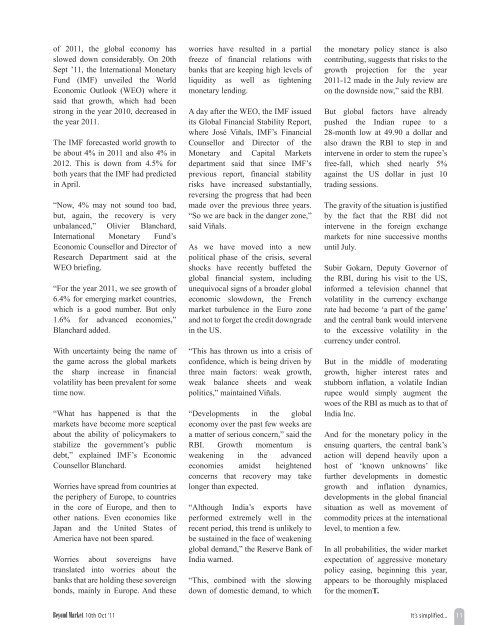Take me to PDF file - Online Share Trading
Take me to PDF file - Online Share Trading
Take me to PDF file - Online Share Trading
You also want an ePaper? Increase the reach of your titles
YUMPU automatically turns print PDFs into web optimized ePapers that Google loves.
of 2011, the global economy has<br />
slowed down considerably. On 20th<br />
Sept ’11, the International Monetary<br />
Fund (IMF) unveiled the World<br />
Economic Outlook (WEO) where it<br />
said that growth, which had been<br />
strong in the year 2010, decreased in<br />
the year 2011.<br />
The IMF forecasted world growth <strong>to</strong><br />
be about 4% in 2011 and also 4% in<br />
2012. This is down from 4.5% for<br />
both years that the IMF had predicted<br />
in April.<br />
“Now, 4% may not sound <strong>to</strong>o bad,<br />
but, again, the recovery is very<br />
unbalanced,” Olivier Blanchard,<br />
International Monetary Fund’s<br />
Economic Counsellor and Direc<strong>to</strong>r of<br />
Research Depart<strong>me</strong>nt said at the<br />
WEO briefing.<br />
“For the year 2011, we see growth of<br />
6.4% for e<strong>me</strong>rging market countries,<br />
which is a good number. But only<br />
1.6% for advanced economies,”<br />
Blanchard added.<br />
With uncertainty being the na<strong>me</strong> of<br />
the ga<strong>me</strong> across the global markets<br />
the sharp increase in financial<br />
volatility has been prevalent for so<strong>me</strong><br />
ti<strong>me</strong> now.<br />
“What has happened is that the<br />
markets have beco<strong>me</strong> more sceptical<br />
about the ability of policymakers <strong>to</strong><br />
stabilize the govern<strong>me</strong>nt’s public<br />
debt,” explained IMF’s Economic<br />
Counsellor Blanchard.<br />
Worries have spread from countries at<br />
the periphery of Europe, <strong>to</strong> countries<br />
in the core of Europe, and then <strong>to</strong><br />
other nations. Even economies like<br />
Japan and the United States of<br />
A<strong>me</strong>rica have not been spared.<br />
Worries about sovereigns have<br />
translated in<strong>to</strong> worries about the<br />
banks that are holding these sovereign<br />
bonds, mainly in Europe. And these<br />
worries have resulted in a partial<br />
freeze of financial relations with<br />
banks that are keeping high levels of<br />
liquidity as well as tightening<br />
monetary lending.<br />
A day after the WEO, the IMF issued<br />
its Global Financial Stability Report,<br />
where José Viñals, IMF’s Financial<br />
Counsellor and Direc<strong>to</strong>r of the<br />
Monetary and Capital Markets<br />
depart<strong>me</strong>nt said that since IMF’s<br />
previous report, financial stability<br />
risks have increased substantially,<br />
reversing the progress that had been<br />
made over the previous three years.<br />
“So we are back in the danger zone,”<br />
said Viñals.<br />
As we have moved in<strong>to</strong> a new<br />
political phase of the crisis, several<br />
shocks have recently buffeted the<br />
global financial system, including<br />
unequivocal signs of a broader global<br />
economic slowdown, the French<br />
market turbulence in the Euro zone<br />
and not <strong>to</strong> forget the credit downgrade<br />
in the US.<br />
“This has thrown us in<strong>to</strong> a crisis of<br />
confidence, which is being driven by<br />
three main fac<strong>to</strong>rs: weak growth,<br />
weak balance sheets and weak<br />
politics,” maintained Viñals.<br />
“Develop<strong>me</strong>nts in the global<br />
economy over the past few weeks are<br />
a matter of serious concern,” said the<br />
RBI. Growth mo<strong>me</strong>ntum is<br />
weakening in the advanced<br />
economies amidst heightened<br />
concerns that recovery may take<br />
longer than expected.<br />
“Although India’s exports have<br />
perfor<strong>me</strong>d extre<strong>me</strong>ly well in the<br />
recent period, this trend is unlikely <strong>to</strong><br />
be sustained in the face of weakening<br />
global demand,” the Reserve Bank of<br />
India warned.<br />
“This, combined with the slowing<br />
down of do<strong>me</strong>stic demand, <strong>to</strong> which<br />
the monetary policy stance is also<br />
contributing, suggests that risks <strong>to</strong> the<br />
growth projection for the year<br />
2011-12 made in the July review are<br />
on the downside now,” said the RBI.<br />
But global fac<strong>to</strong>rs have already<br />
pushed the Indian rupee <strong>to</strong> a<br />
28-month low at 49.90 a dollar and<br />
also drawn the RBI <strong>to</strong> step in and<br />
intervene in order <strong>to</strong> stem the rupee’s<br />
free-fall, which shed nearly 5%<br />
against the US dollar in just 10<br />
trading sessions.<br />
The gravity of the situation is justified<br />
by the fact that the RBI did not<br />
intervene in the foreign exchange<br />
markets for nine successive months<br />
until July.<br />
Subir Gokarn, Deputy Governor of<br />
the RBI, during his visit <strong>to</strong> the US,<br />
infor<strong>me</strong>d a television channel that<br />
volatility in the currency exchange<br />
rate had beco<strong>me</strong> ‘a part of the ga<strong>me</strong>’<br />
and the central bank would intervene<br />
<strong>to</strong> the excessive volatility in the<br />
currency under control.<br />
But in the middle of moderating<br />
growth, higher interest rates and<br />
stubborn inflation, a volatile Indian<br />
rupee would simply aug<strong>me</strong>nt the<br />
woes of the RBI as much as <strong>to</strong> that of<br />
India Inc.<br />
And for the monetary policy in the<br />
ensuing quarters, the central bank’s<br />
action will depend heavily upon a<br />
host of ‘known unknowns’ like<br />
further develop<strong>me</strong>nts in do<strong>me</strong>stic<br />
growth and inflation dynamics,<br />
develop<strong>me</strong>nts in the global financial<br />
situation as well as move<strong>me</strong>nt of<br />
commodity prices at the international<br />
level, <strong>to</strong> <strong>me</strong>ntion a few.<br />
In all probabilities, the wider market<br />
expectation of aggressive monetary<br />
policy easing, beginning this year,<br />
appears <strong>to</strong> be thoroughly misplaced<br />
for the mo<strong>me</strong>nT.<br />
Beyond Market 10th Oct ’11 It’s simplified... 11


